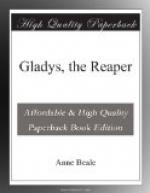The ragged school children loved him, and through them, he got at the hearts of some of their degraded parents. His seemed a labour of love with every one but her. She received his marked politeness and nothing more. But he interested her daily. Some new trait of character would break out—some little touch of deep feeling—some symptom of a highly sensitive nature, which told her how much he must have felt her cutting words. He was proud, too, and she liked him for it, although she was striving to humble her own pride. What would she not have given to have recalled those words! The Rowland Prothero of London, esteemed and loved by the wise and good, for his unpretending but strenuous parochial labours, his clear, forcible, but very simple preaching—was to her quite a different person from him of Glanyravon Farm, the son of her father’s tenant. In short they were no longer identical. As she was no longer the heiress of Glanyravon, but simply Miss Gwynne, Mrs. Jones’ friend—so he was Mr. Rowland Prothero, a respectable and respected London clergyman.
And these are the relations under which they appear, sitting near one another over the accounts of the ragged school, which Freda has undertaken to keep.
‘I think there is a slight fault here, Miss Gwynne,’ he says, pointing out an error in calculation.
’Of course, I never had a head for figures, and Mrs. Jones could never get me to do my sums.’
’Still, the account is quite right in the main, the errors were in the adding up, and it is rightly balanced.’




